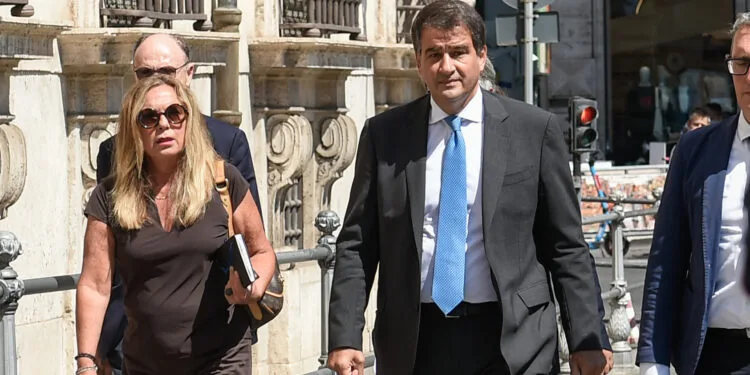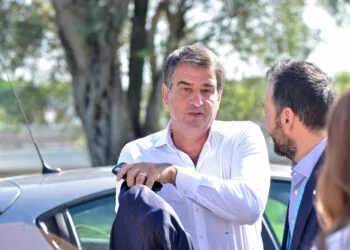Brussels – What we might now call “the Fitto affair” continues to hold sway, at least among the corridors of Brussels. Ever since the officialdom of the nomination of the current Minister of European Affairs, Raffaele Fitto, as the Italian candidate for the next EU Commission, a whirlwind of statements, denials, accusations and counter-accusations related to his possible nomination as one of the executive vice-presidents has been set in motion. Even to the point of dusting off the events of five years ago, when the Dem Paolo Gentiloni received the green light from conservative MEPs as a member of the first von der Leyen College (but there was no vote in which Italian ECR exponents expressed themselves). On the Italian side, the issue revolves around whether the name indicated by Rome should be supported as the candidate of the country rather than of the government, as the centre-right demands. In the EU Parliament, on the other hand, there are growing protests from the pro-European majority partners (Socialists, Greens, and Liberals) against the assignment of an executive vice-presidency of the EU executive to an extreme right-wing exponent.
On Wednesday (September 11), Commission President-elect Ursula von der Leyen was supposed to present her team for the five years 2024–2029 to the European Parliament. Instead, the appointment has been postponed to September 17, during the Strasbourg Plenary, and in Brussels, the debate continues over Fitto‘s candidacy for the vice presidency (one of the expected four or five) of the second college led by the German popular leader, and the negotiations that the Commission chairwoman is conducting with political forces and governments continue.
As has long been known, Italy’s premier, Giorgia Meloni, would like for her loyalist an economic portfolio—the one for which the nickname “mister trillion” has already been coined, about the possible budget and/or NextGenerationEu assignment—and, above all, a “weighty role” within the next Commission. This, translated, means an executive vice-presidency, which would place him (along with Spanish socialist Teresa Ribera, French liberal Thierry Breton, and Latvian popular Valdis Dombrovskis) in the inner circle of the most powerful commissioners. However, reiterated by the government allies, Lega and Forza Italia, these demands have given rise to a political case between Rome and Brussels.
At the European Parliament, the list of the political forces to which von der Leyen owes her reappointment and who oppose the conferral of a role as executive vice-president for a member of a party, the Conservatives and Reformists (ECR), which they consider radical right-wing and with which they have long declared they will not cooperate, is growing longer. After the stop from the Liberals (Renew) and the Greens (G/EFA), yesterday also arrived the warning from the Socialists (S&D), who are lying in wait for the president-elect: “proactively bringing ECR into the heart of the Commission,” read a note yesterday (September 10), is a good recipe “for losing the support of progressives.”
However, the Social Democratic front in the Parliament is not united, as the Democratic Party, the largest part of the S&D group, has instead expressed its support towards Fitto’s candidacy through the voice of Nicola Zingaretti, the head of the delegation. “We welcome a weighty role for Italy; we defend this prerogative,” the former Lazio governor told the press, adding that “we will judge Commissioner Fitto without any prejudice.” It seems, in the words of their head of delegation, that the Dems are thus intent on responding affirmatively to the call, launched by the government on several occasions, to support the minister in Europe going beyond party divisions. It seems, however, that the delegation is divided and that a large part of the Dem deputies still want to block the nomination.
Carlo Calenda, secretary of Action (which is affiliated with Renew in Europe, although it did not elect representatives to the EU Parliament last June), said that “we should support” Fitto (whom he calls a moderate) because “the fact that we do not like the government does not mean that we should not have a representative in the European Commission of weight and value.”
Representatives of Fratelli d’Italia, Lega and Forza Italia went even further, claiming that the opposition’s support for the Melonian candidate (“rallying around him,” in the words of Forza Italia MEP Salvatore De Meo) is almost a due act to reciprocate the one provided in autumn 2019. At the time, when the red/yellow government had just taken office, Paolo Gentiloni easily passed the hearings of the MEPs. He took up his duties as commissioner of the economy, thanks to the absence of opposition from the centre-right MEPs, who were then in opposition in Rome.
In the reconstruction of events five years ago, when von der Leyen was composing her first college, some passages ended up being lined up in a somewhat disingenuous manner. Gentiloni was indeed approved without a fuss in the parliamentary committee, but, as the Pentastellist MEP Gaetano Pedullà correctly recalled, it is inaccurate to say, as some on the right claim, that Fratelli d’Italia voted in favour of the Italian commissioner. On that occasion, he recalls, “no vote was held because Gentiloni’s candidacy passed during the coordinators’ meeting, which was behind closed doors, and no FdI MEP was part of it.” Fratelli d’Italia, however, then voted for confidence in the von der Layen I Commission as a whole.
The political crux of the whole issue is that the problem is not so much Fitto’s profile (hard to see him as a dangerous extremist, given that his political trajectory has always been closer to the centre than the right), as it is, at least for the Populars’ allies in the “Ursula 2.0,” getting someone from the ECR into the most coveted control rooms, effectively breaking a cordon sanitaire that had resisted until now.
“The real contradiction,” said Dem MEP Matteo Ricci, is that of Italian Prime Minister Giorgia Meloni, “who with the ECR group takes sides against Von der Leyen and her pro-European agenda and then appoints an Italian commissioner from her own party who should follow that agenda.” Moreover, after abstaining in the European Council on the German lady’s second term at the Berlaymont palace and making FdI MEPs vote against her reappointment. In all likelihood, however, the Fitto affair will not end anytime soon, as the hearings for commissioner candidates could drag on, in the worst-case scenario, until late November.
English version by the Translation Service of Withub





